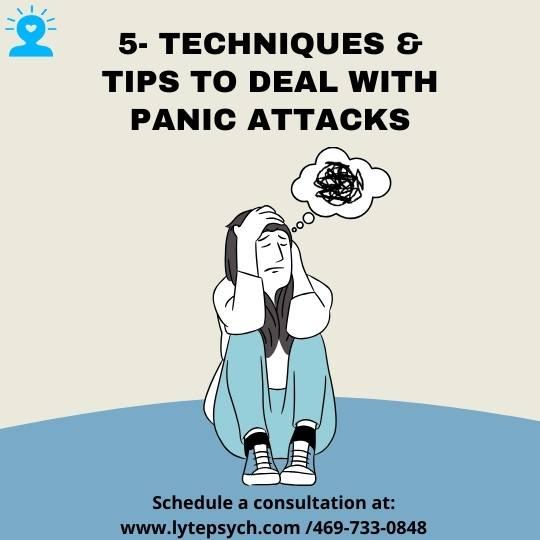Tue Jun 11 2024
How to Deal with Panic Attacks 5- Techniques and Tips from Lyte Psychiatry (Affordable Therapist and Psychiatrist Near You), Best Adults & Adolescents Psychiatrist and Therapist Near You, Dallas, Fort Worth, TX

How to Deal with Panic Attacks: 5 Techniques and Tips from Lyte Psychiatry (Affordable Therapist and Psychiatrist Near You) Dallas, TX
Panic attacks can be overwhelming and frightening, often striking without warning and leaving you feeling out of control. They can interfere with your daily life and overall well-being. At Lyte Psychiatry, we understand the challenges of dealing with panic attacks and are here to provide support and guidance.
Here are five techniques and tips to help you manage and reduce the impact of panic attacks.
1. Practice Deep Breathing
How to Do It:
Find a comfortable position: Sit or lie down.
Inhale slowly: Breathe in deeply through your nose for a count of four.
Hold your breath: Hold the breath for a count of four.
Exhale slowly: Breathe out through your mouth for a count of six.
Repeat: Continue this cycle for a few minutes until you feel calmer.
Tip: Practice deep breathing regularly, even when you’re not experiencing a panic attack, to make it a natural response during times of stress.
2. Use Grounding Techniques
Why It Helps: Grounding techniques help bring your focus back to the present moment, reducing feelings of fear and disorientation.
How to Do It:
5-4-3-2-1 Method: Identify 5 things you can see, 4 things you can touch, 3 things you can hear, 2 things you can smell, and 1 thing you can taste.
Engage your senses: Carry a small object, like a stress ball or a smooth stone, to hold and feel during a panic attack.
Describe your surroundings: Mentally describe your environment in detail to divert your mind from the panic.
Tip: Keep a list of grounding techniques handy to quickly refer to when you feel a panic attack coming on.
3. Challenge Negative Thoughts
Why It Helps: Challenging and reframing negative thoughts can reduce the intensity of panic attacks by addressing the underlying anxiety.
How to Do It:
Identify the thought: Write down the negative thought causing your anxiety.
Challenge the thought: Ask yourself if the thought is based on facts or assumptions.
Reframe the thought: Replace the negative thought with a more balanced and positive one.
Tip: Keep a journal to track your thoughts and the process of challenging them, which can help reinforce positive thinking patterns over time.
4. Practice Mindfulness and Meditation
Why It Helps: Mindfulness and meditation help increase awareness of your thoughts and feelings, promoting a sense of calm and control.
How to Do It:
Set aside time: Dedicate 10-15 minutes each day to mindfulness or meditation.
Focus on your breath: Pay attention to the sensation of breathing, observing each inhale and exhale.
Use guided meditations: Apps like Headspace or Calm offer guided sessions that can help you get started.
Tip: Integrate mindfulness practices into your daily routine, such as mindful eating or walking, to enhance your overall sense of well-being.
5. Create a Panic Attack Action Plan
Why It Helps: Having a predetermined plan in place can provide a sense of control and reduce the fear of experiencing a panic attack.
How to Do It:
Identify triggers: Note down situations or events that commonly trigger your panic attacks.
List coping strategies: Write down the techniques that work best for you, such as deep breathing or grounding exercises.
Seek support: Include contact information for trusted friends, family members, or mental health professionals who can offer support.
Tip: Review and update your action plan regularly to ensure it remains effective and relevant to your needs.
Seeking Professional Help at Lyte Psychiatry ( Best Adults and Adolescents Therapist and Psychiatrist Near You)
Panic attacks can be challenging, but with the right techniques and support, you can manage and reduce their impact on your life. At Lyte Psychiatry, we are committed to helping you develop effective coping strategies and achieve better mental health. If you’re struggling with panic attacks, don’t hesitate to reach out to us for professional support and guidance.
To Schedule an appointment. Click Here
To see our services. Click Here
Call us if you have questions at 469-733-0848
Frequently Asked Questions (FAQs)
Q: What are the common triggers of panic attacks?
A: Common triggers can include stress, major life changes, caffeine, certain medications, and traumatic experiences. Identifying your specific triggers can help in managing panic attacks more effectively.
Q: Can panic attacks be cured?
A: While panic attacks may not be completely cured, they can be effectively managed with proper treatment and coping strategies. Many people experience significant improvement with therapy and lifestyle changes.
Q: How long do panic attacks typically last?
A: Panic attacks usually peak within 10 minutes and can last up to 30 minutes, though the duration can vary from person to person.
Q: Should I avoid situations that trigger my panic attacks?
A: While it may be tempting to avoid triggers, doing so can limit your life and increase anxiety over time. Gradual exposure and coping strategies can help you face and manage triggers more effectively.
Q: Is medication necessary for treating panic attacks?
A: Medication can be helpful for some individuals, but it is often used in conjunction with therapy and lifestyle changes. A mental health professional can help determine the best treatment plan for you.